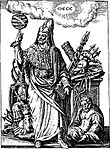The Discourse on the Eighth and Ninth
| Part of a series on |
| Hermeticism |
|---|
 Hermes Trismegistus |
| Hermetic writings
|
| Historical figures
|
|
The Discourse on the Eighth and Ninth is an ancient Hermetic treatise. It is one of the three short texts attributed to the legendary Hellenistic figure Hermes Trismegistus that were discovered among the Nag Hammadi findings.[1]
Insufficient information has survived from the manuscript to reconstruct the original title, and so the modern title has been taken from an expression in the treatise itself.[2] References to the Egyptian city of Diospolis[3] and to hieroglyphic characters, as well as certain affinities with the Middle Platonist philosopher Albinus (fl. c. 150 CE), point to a composition in Roman Egypt somewhere in the second century CE.[4] It only exists in a Coptic translation, the original Greek being lost.[5]
References
- ^ No. (VI,6). Available at the Gnostic Society Library, reproduced with permission from Brashler, James; Dirkse, Peter A.; Parrott, Douglas M. (trs.), "The Discourse on the Eighth and Ninth (VI,6)", originally published in: Robinson, James M. 1978. The Nag Hammadi Library in English. Leiden: Brill. The other two Hermetic texts in the Nag Hammadi library are The Prayer of Thanksgiving (VI,7) with its Scribal Note (VI,7a) and fragments from the Asclepius (VI,8); see Robinson, James M. 1990. The Nag Hammadi Library in English. 3rd, revised edition. New York: HarperCollins.
- ^ Parrot, Douglas M. 1990. "The Discourse on the Eighth and Ninth (VI,6)" (introduction) in: Robinson, James M. 1990. The Nag Hammadi Library in English. 3rd, revised edition. New York: HarperCollins, p. 321.
- ^ It is not clear whether the treatise refers to Diospolis Magna (a Ptolemaic name for the ancient Egyptian city Thebes) or to Diospolis Parva (a Ptolemaic name for the ancient Egyptian city Hu); see Robinson, James M. 1990. The Nag Hammadi Library in English. 3rd, revised edition. New York: HarperCollins, pp. 12-13.
- ^ Parrot, Douglas M. 1990. "The Discourse on the Eighth and Ninth (VI,6)" (introduction) in: Robinson, James M. 1990. The Nag Hammadi Library in English. 3rd, revised edition. New York: HarperCollins, p. 322.
- ^ The Nag Hammadi library consists entirely of Coptic works translated from the Greek; see Robinson, James M. 1990. The Nag Hammadi Library in English. 3rd, revised edition. New York: HarperCollins, pp. 12-13.
Further reading
- Bull, Christian H. (2018). "Heavenly Ascent: The Discourse on the Eighth and the Ninth (NHC VI,6)". The Tradition of Hermes Trismegistus: The Egyptian Priestly Figure as a Teacher of Hellenized Wisdom. Religions in the Graeco-Roman World. Vol. 186. Leiden: Brill. pp. 316–371. doi:10.1163/9789004370845_008. ISBN 978-90-04-37084-5.
- Mahé, Jean-Pierre (1998). "A Reading of the Discourse on the Ogdoad and the Ennead (Nag Hammadi Codex VI.6)". In Van den Broek, Roelof; Hanegraaff, Wouter J. (eds.). Gnosis and Hermeticism from Antiquity to Modern Times. Albany: State University of New York press. pp. 79–85. ISBN 9780791436110.
- Roig Lanzillotta, Lautaro (2021). "The Discourse on the Eighth and the Ninth (NHC VI,6), the Prayer of Thanksgiving (NHC VI,7), and the Asclepius (NHC VI,8): Hermetic Texts in Nag Hammadi and Their Bipartite View of Man". Gnosis: Journal of Gnostic Studies. 6 (1): 49–78. doi:10.1163/2451859X-12340102.
This philosophy-related article is a stub. You can help Wikipedia by expanding it. |
- v
- t
- e











